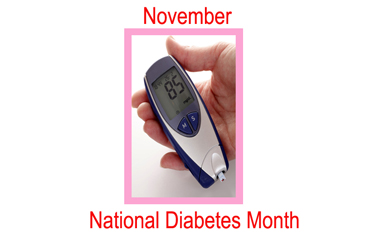November is celebrated as National Diabetic Month in the U.S. to raise awareness about this chronic condition.
 The incidence of diabetes is rising and it is now considered an epidemic. According to the 2017 National Diabetic Statistics Report, over 30 million people living in the U.S. have diabetes, that’s almost 10 percent of the country’s population. Diabetes is the seventh leading cause of death in the U.S., and was responsible, at least in part, for over 250,000 deaths in 2015. All this makes it crucial to take steps to reverse diabetes and the diabetes epidemic in America.
The incidence of diabetes is rising and it is now considered an epidemic. According to the 2017 National Diabetic Statistics Report, over 30 million people living in the U.S. have diabetes, that’s almost 10 percent of the country’s population. Diabetes is the seventh leading cause of death in the U.S., and was responsible, at least in part, for over 250,000 deaths in 2015. All this makes it crucial to take steps to reverse diabetes and the diabetes epidemic in America.
The statement from President Donald J. Trump on National Diabetes Month, 2017 states that “millions of Americans with diabetes or prediabetes are unaware of their medical condition. Proper information, combined with improved nutrition and exercise, can save lives. We also take this opportunity to renew our support for the tens of millions of Americans who are currently battling diabetes.”
There are three types of diabetes, type 1, type 2, and gestational. Type 2 is the most common type and arises when an issue within the body leads blood glucose levels to rise higher than normal, causing the body to not use insulin properly. People with type 2 diabetes can slow or stop the progress of type 2 diabetes by making lifestyle changes to keep your insulin problems under control as diabetes are triggered by insulin resistance and regaining proper insulin sensitivity can help reverse the process. Type 2 diabetes can initially be managed through a healthy diet, regular exercise and monitoring your blood glucose levels.
- Eating well helps manage your blood glucose levels and your body weight. The diet of diabetic person would be same as of an ordinary person. The only thing is to aim to eat a diet that is low in fat, high in fiber and include lots of fruits and vegetables. Limit foods that are high in energy such as take away foods, sweet biscuits, cakes, sugar sweetened drinks and fruit juice, chocolate, and savory snacks.
- Exercising helps the insulin work more effectively, lowers your blood pressure, reduces the risk of heart disease and helps to keep your heart healthy and strong. Staying fit and active throughout your life can control diabetes and keep blood glucose levels in the correct range.
- Monitoring blood glucose regularly and recording your level can support your healthy lifestyle choices as well as inform you of your response to other choices and influences. The results may show you if you need to change in your diabetes management plan.
- Your physician will help you to figure out if you need to take medicine, which kind is right for you, and how often you should take it. Medications such as tablets or injections prescribed by your physician should be followed along with healthy eating and regular activity, not as a substitute. Effective management of diabetes involves maintaining a proper balance between the foods you eat, activity levels, and the amount of medication you take to manage the condition.
- Reduce stress levels because stress can lead to hormone imbalances and insulin issues. Focus on getting quality sleep every night to reduce stress hormone levels.
Early diagnosis, best treatment and effective ongoing support and management can reduce the risk of complications made by diabetes.
When it comes to preventing or delaying diabetes, the focus should be in losing weight if you are overweight by reduced-calorie eating plan, staying physically active and maintaining a healthy lifestyle through your life. Avoid junk, processed and sweetened foods and add fiber to your diet. Ask your health care professional about what other changes you can make to prevent or delay type 2 diabetes.